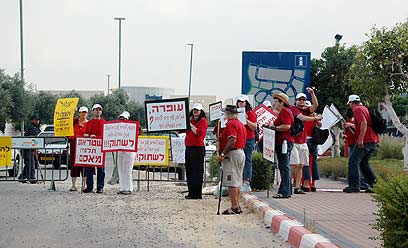
It may not be swine flu, but the symptoms of Celiac disease can be varied and intense, and often take many months to correctly diagnose in suffering patients. Symptoms can include bloating, gas, severe diarrhea, headaches, skin rash, and poor weight gain, and can also lead to unexplained depression, infertility and attention deficit disorder.
In a recent study conducted at the Division of Pediatric Gastroenterology and Nutrition at the Rambam Medical Center in Haifa, doctors found that previous statistics which suggested only 1:786 Israelis were Celiac sufferers was grossly incorrect and more realistically about 1:157 Israelis are affected by the disorder. This means that about 45,000 Israelis have celiac and may or may not know it.

2007: Celiac patients protest Osem's sweeping labeling of foods as potentially containing gluten (Photo: Eran Feldman)
Celiac disease is often confused with irritable bowel syndrome, iron deficiency anemia, or intestinal infections. According to the National Digestive Diseases Information Clearing House, it can take years to correctly diagnose celiac disease as the culprit of a person’s symptoms. To check for gluten intolerance, doctors can either perform a blood test for high levels of anti-tissue transglutaminase antibodies or they can perform a biopsy of the small intestine.
Keeping a 100% gluten free diet is the only way to treat Celiac disease. After going on the diet many people see their symptoms clear up immediately.
Celiac in the IDF
Beginning this year, celiac sufferers may be drafted into the IDF for mandatory service. Previously, Israelis who have celiac disease were not required to serve because of the difficulty of separating gluten free food from regular food. Some people with celiac disease are sensitive enough to gluten that if they eat French fries that were fried in the same pot as breaded chicken they can have an allergic reaction.A defense official from the IDF promised that celiac sufferers who serve on closed bases, will receive gluten free catering. Those who serve on open bases will receive a food allowance to buy gluten free food.
Common foods that cannot be eaten include bread, pasta, cookies, most cakes, soy sauce, and beer. Gluten can also be found in many canned soups, pre-packaged rice mixes, and medicines, so it is always a good idea to check labels before eating.
Gluten free in Israel
May is celiac awareness month in Israel, making this a great month to be an Israeli celiac sufferer or a traveler with celiac disease. To raise awareness about celiac disease, many restaurants in Tel Aviv and across Israel will be offering gluten free menu options in addition to their regular menu.To find more information about eating out gluten free or buying gluten free products in Israel, www.celiac.org.il is very helpful. They have a list of restaurants that offer gluten free menus year round (though there are only a few) as well as the locations of health food stores called Beit Teva which sell gluten free items.
The largest store in Israel for gluten free products is GlutenFree.co.il, an internet-based site in which every item is gluten free and kosher and can be shipped anywhere in Israel and abroad within days of ordering. The store itself is located in Petah Tikva and people can go and taste a variety of the items that they have on site and are also available for immediate purchase.















